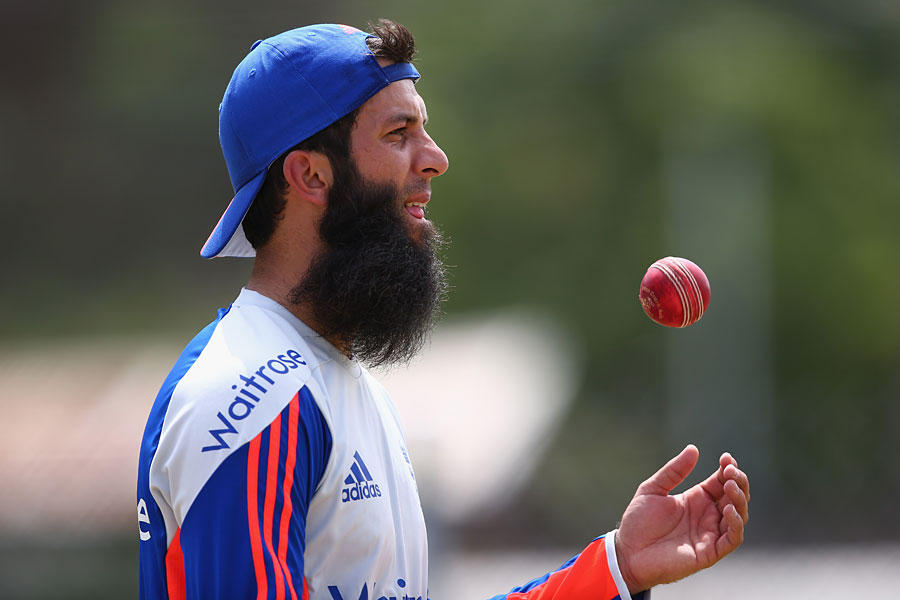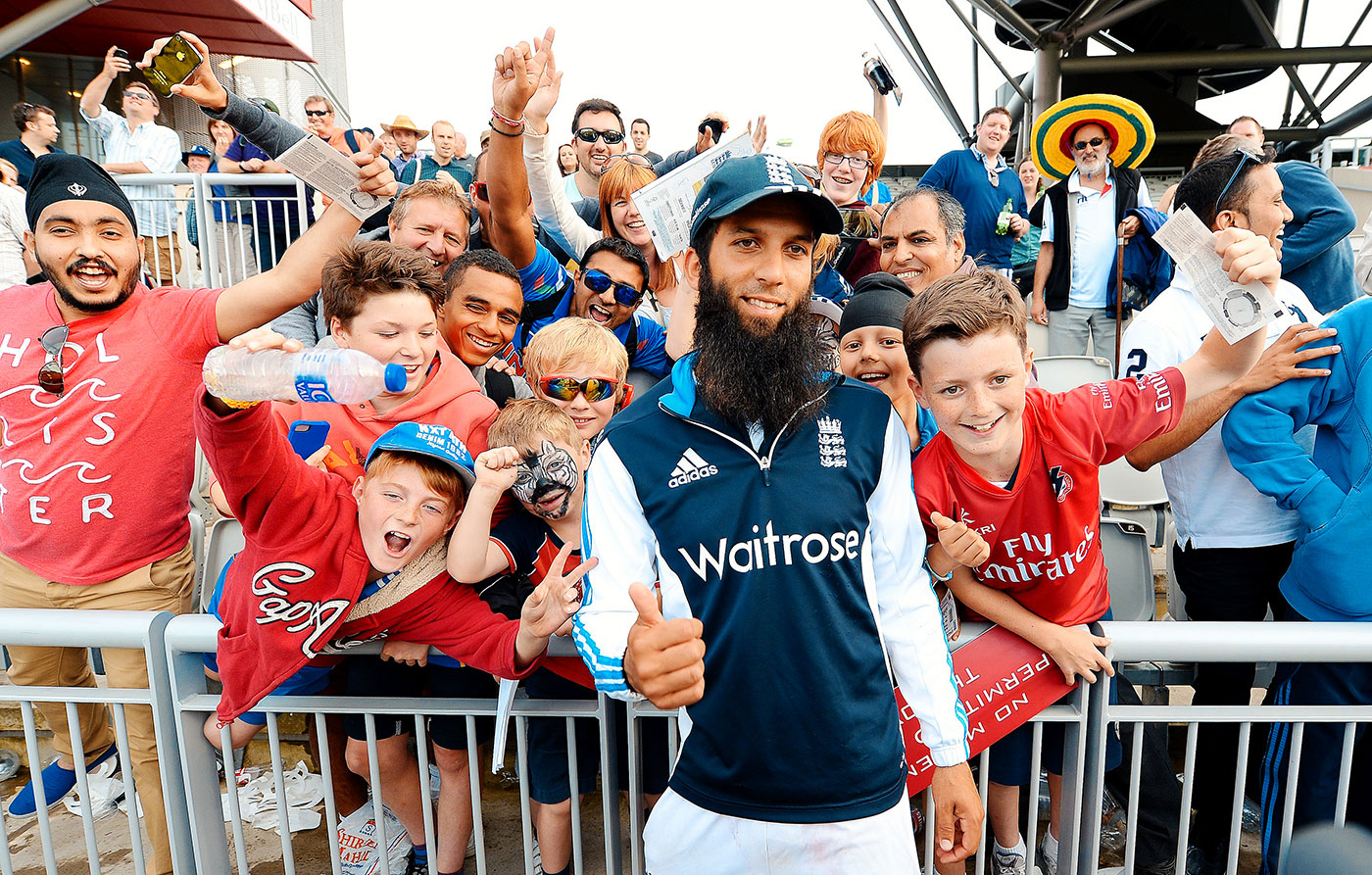Resitting the Tebbit test
Sarfraz Manzoor

Moeen Ali learned his cricket in Sparkhill, Birmingham © Getty Images
September 7 should have been a memorable day for Moeen Ali: a Birmingham born cricketer of South Asian heritage stepping out to play for England against India on a late summer's day at Edgbaston, in front of a home crowd that included his parents. The day did turn out to be memorable - but not for the reasons he would have wished.
Throughout the game, whether he was batting, bowling or fielding, Ali was booed by fans supporting India. This prompted a complaint from a member of the public of racially motivated abuse, which led police to classify it as a "noncrime hate-related incident". A "hate incident", according to the Association of Chief Police Officers, "may or may not constitute a criminal offence, which is perceived by the victim or any other person as being motivated by prejudice or hate". Police were unable to take further action without a complaint from Ali himself, but he did not want to pursue the matter. "I won't say it hurt me," he said. "It was more disappointing that I live ten minutes away, and I'm getting booed by people who I feel I'm supposed to represent."
So why were they booing him - and were their actions harmless pantomime fun, or something altogether more dispiriting? The British Asian fans who attended the match were mostly the second- and third-generation sons and daughters of immigrants who arrived from the subcontinent in the 1960s. They had cricket-obsessed fathers who were raising families at a time when racism in this country was both common and tolerated.
It was rare to see a brown face on television; when they did appear, they were expected to be the butt of racist jokes. Beaten and abused, discriminated and mocked, those from Indian and Pakistani backgrounds had precious little they could take pride in. Cricket offered a rare opportunity: the brown man might score a decisive and public victory against the white.
When I was growing up in the 1980s, my Pakistani father would regale us with stories about the great fast bowler Fazal Mahmood, who helped Pakistan beat Len Hutton's England at The Oval in 1954. Coupled with the sad state of race relations back then, the South Asian love of cricket cemented a sense that one supported the motherland, rather than the team of the country one now called home. I cheered for Pakistan whenever they came to play in Britain. It may have seemed like disloyalty to others, but to me it would have been a betrayal to do anything else.
Moeen Ali's father, Munir, also grew up supporting Pakistan. He married and had four children, and all three of his sons went on to reach a high level in the game - Moeen's brothers Kadeer and Omar have played for Worcestershire and Herefordshire respectively, while two of his cousins have also played county cricket; one of them, Kabir Ali, represented England. It was only when his children began to play professionally that Munir changed his allegiance.
That journey was continued by his son: Moeen has demonstrated it is possible to reconcile being British, Pakistani and Muslim, while being accepted by the overwhelming majority of cricket fans. "Moeen is up front about his faith," says Munir. "He is not ashamed of what he is, and a lot of English people have accepted him."
In the Edgbaston crowd, those who seemed least accepting of him appeared to be from the British Indian contingent. Dipesh, an 18-year-old from Essex, was among them. "I will admit that I did boo Moeen," he says. "But the only reason was to try and put England's player of the year off his game."
This explanation was repeated by other fans: Ali had bowled very well against India in the Test series, and was regarded as a threat. These fans went on to complain that the criticism they faced after the match was unfair, that they were victims of double standards. "The English fans booed Jadeja because he complained Anderson pushed him," says Akshay, 24, who was also at Edgbaston. "Isn't that bullying? Surely that is unacceptable? But it's accepted because it's a sport, and the crowd are supporting their team and want Jadeja to know he isn't liked, and the English don't want him to do well."
Yet, if it was simply Ali's form that inspired the booing, he could have viewed it as a compliment, as Angus Porter, the Professional Cricketers' Association chief executive, suggested: "You are more likely to boo someone when you think they are to be feared. Take it as a positive: you'd rather be booed than ignored." Porter later apologised, because the booing was not - as the fans I talked to also acknowledged - a comment on Ali's cricketing talent alone.
"The mindset we have when booing Moeen Ali is that not only is he our opposition on the day, but he is a Pakistani opposition - our country's biggest rival," admits Akshay. He may have been born in England, but those fans did not see an Englishman: they saw a Pakistani. "Some Indian fans did boo because of Ali's Pakistani heritage," says Dipesh. "And while some of it was light-hearted, other abuse directed at Ali was at times malicious and could be described as racist. Hearing racial slurs aimed at him made me feel embarrassed and even sorry for him."
Akshay does not agree that it was anything unpleasant: "How can people class this as racist? Booing has never been a crime and happens in all sports. England have a fierce rivalry with Australia. Why are you allowed rivalries between other nations, but not between India and Pakistan?" It is a rivalry that seems to have crossed continents and generations. Reena, a 33-year-old from Manchester, says: "Tensions still exist between British Indian and Pakistani communities, as they tend to live separately, even when they are in close proximity. Intermarriage between the communities is relatively uncommon."
Yet the fans at Edgbaston were not Indian or Pakistani: they were British. So why were they still harking back to historic rivalries? Why weren't they all supporting England? This was the question posed by the then Conservative MP Norman Tebbit 25 years ago during an interview with the Los Angeles Times, in which he suggested that the question of which cricket team one supported was a useful way of assessing loyalty to Britain. The "Tebbit test" remains controversial and divisive.
Lord Tebbit says now: "The expectation is that, if you give up your own country because it has failed you, and go to another country, to live there, make your home there and raise your children there, it's rather expected that you would become part of that society, and not carry on with your own hostilities from other societies." It is an attitude shared by Munir Ali - "we live in this country and we should support it" - but not by all British Asian cricket fans.
What enraged some of them were comments Moeen had made before the match. "He said the Indian fans born in England should support England," says Reena. "But every individual should be able to choose whichever team in whichever sport they want to follow." Akshay adds: "Ali's comments about India fans supporting England frighteningly mirrored sentiments of the likes of Tebbit." The Indian fans disputed the suggestion that they had any obligation to support England. "The Tebbit test is an attack on freedom," claims Aashish, a 29-year-old Londoner.
"British Indians should be free to support whoever they want - politics, race and sport should be kept separate." Lord Tebbit disagrees: "If I accept the incomer as part of the family, I rather expect the incomer to join the family." The implication of the Tebbit test was that it told you something more profound about feeling British, but this is challenged by those who choose to support India. They support England in everything but cricket, a sport which gives them a chance to acknowledge their heritage. This explains why Ravi Bopara was also booed that day - though less volubly - even though his heritage is Punjabi Indian. "Every British-born Indian would snap up the opportunity to play for England," admits Akshay.
"But Bopara got booed purely because he is seen as a traitor: he is coming out to score runs against our beloved India. This is nothing personal - you just badly want your side to win." It is tempting to view the saga, and read the reaction of the Indian fans, through a bleak and binary prism, and conclude that it articulates a failure of British multiculturalism. "Where does it end?" asked one former senior England player, speaking on condition of anonymity. "If you have England playing India, and 90% of the home crowd is supporting the opposition, you have to ask why we aren't getting more support down the generations? If they felt 100% English, these third-generation British Asians would be supporting England."

A crowd favourite (among some crowds at least) © PA Photos
I am inclined to be more hopeful, because the truth is arguably more subtle - and surprising. Even as they passionately supported India, those fans had different hopes and expectations for their offspring. "If I had children who wanted to play cricket, despite my love for India and the Indian cricket team, I would want them to don an England shirt," says Dipesh. "This may seem hypocritical given that I support India, but I'm a second-generation Brit Indian.
If I have kids, they'll be third-generation, by which time I would like to see an England team representative of the multicultural society we live in." Others I talked to wondered why so many England players with Asian heritage had fallen by the wayside, and whether more could be done to increase the number of British Asians in the international game. "Knowing how many British Asians play cricket in this country, I find it hard to believe there are not more emerging at the top level," says Aashish. "This is something that the ECB would need to answer."
Andrew Walpole, the ECB's head of corporate communications, responded by saying: "We are seeing a steady flow of British Asian talent into our elite squads, and expect that many of these players will be pushing hard for selection to the senior sides in the near future. We are keen to engage more closely with British Asian players, coaches and the wider club and league structure."
The British Indian fans who booed may view Moeen Ali as Pakistani rather than English, but the reason I remain optimistic about the future is revealed in his past. His grandfather came to Britain in the early 1940s, met a white woman while working in a Birmingham factory, and married her. So Munir Ali is mixed race, and Moeen - the poster boy for British Pakistani Islam - one quarter white. That is why the booing at Edgbaston reveals not only how divided the British Asian community are, but also how entrenched. It gives us an insight into some of the hard questions still facing that community - but, in Moeen, it also hints at where the answers may lie.
Sarfraz Manzoor is a journalist, broadcaster and the author of Greetings from Bury Park, a childhood memoir which he is adapting into a screenplay

